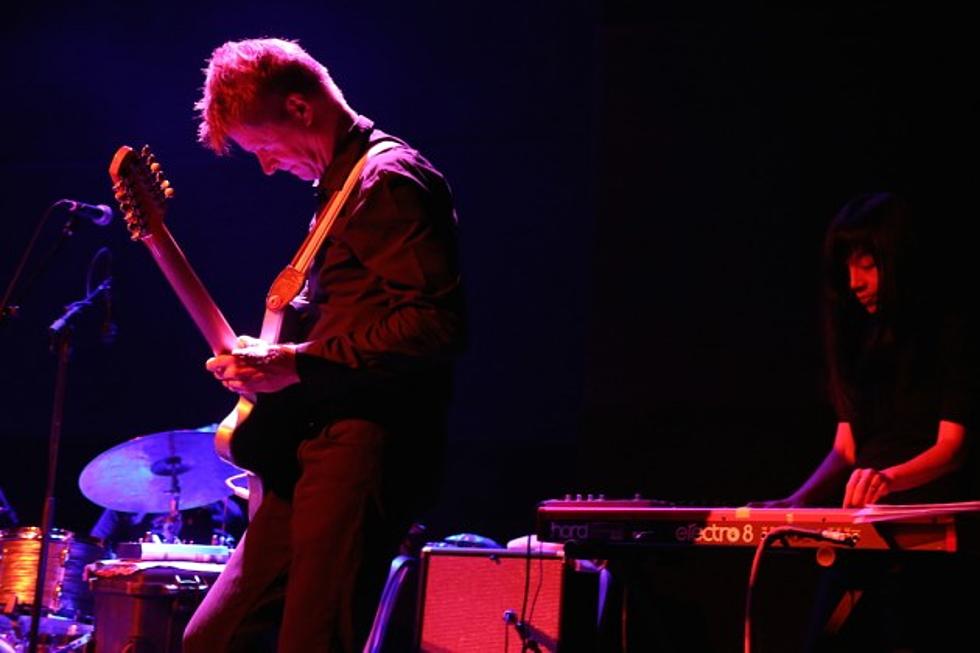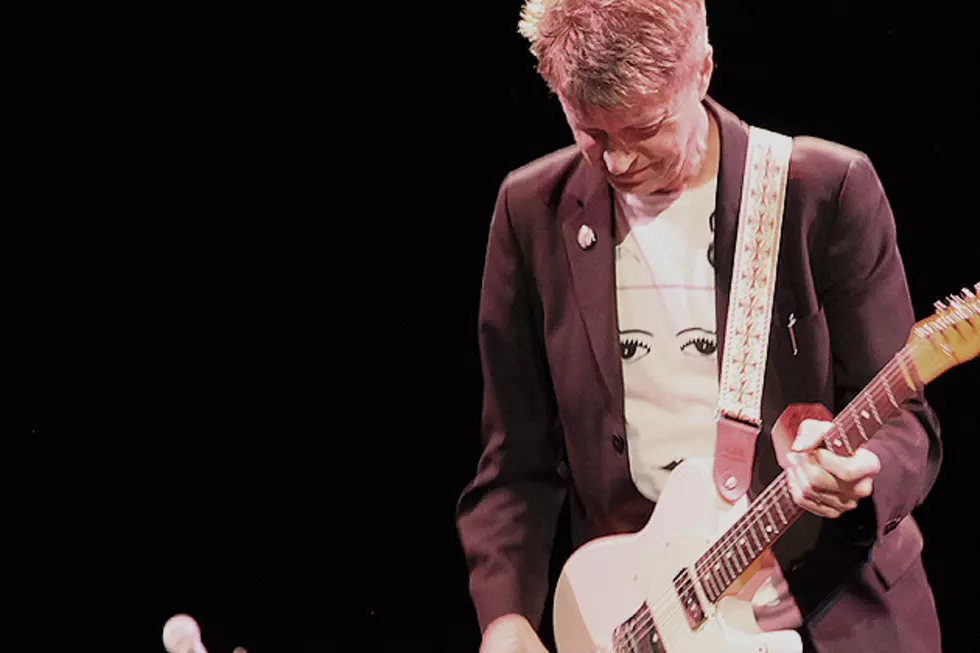
Nels Cline Shares Some of His Biggest Influences
Nels Cline’s small group, the Nels Cline Singers, played two sets on a recent Monday night in New York City, each with its own approach. In the first set, Cline’s guitar crashed into the hulking mountain of drummer Scott Amendola and percussionist Cyro Baptista, then stepped back and pierced its way through, seeping into cracks and ultimately blowing the whole thing apart into a big, cathartic mess. Cline and the band -- and especially Baptist and his seemingly endless arsenal of toys -- delighted in a kind of musical demolition.
The second set was more chameleonic -- opening, appropriately, with Cline’s half-serious tribute to George Benson, 'Red Before Orange,' and then snowballing, picking up elements of Jimi Hendrix, Thurston Moore, and Miles Davis’ late-period waves of electric piano. Cline directed the small group to joyful crescendos, and reached some pretty dazzling heights himself.
It’s this dichotomy, between Cline's skewed, adventurous approach to music and his constant appreciation of other musicians, that makes him a compelling performer, and an equally compelling conversationalist. His comprehensiveness is on display on his work with Wilco, too, -- the pretty, languid solo on ‘Impossible Germany’; the powder keg workout on ‘Spiders,’ from 'Live In Chicago’ -- but in a setting with his band, the vessel for most of his creative energy, it's apparent that the dichotomy defines his style.
We sat down with Cline to talk in depth about his influences, and the music he's listening to now -- a playlist of sorts that spans genres, moods, and decades, and might shed some insight on Cline's broad spectrum of style.
Who is a guitar player you consistently go back to for inspiration?
Jim Hall. Jim Hall is one of the greatest jazz guitar players who ever lived. He died just this year.
Jim Hall is always giving me pure musicality. He’s a very forward-looking player, he wasn’t just traditional -- he had a lot of facets to his playing. He’s very modern, very understated. There is something about understated playing that rewards repeat listening. It’s something that I’m hoping to learn someday, about economy of playing, and restraint. Jim Hall is the guy who for the past few years I realize I keep going back to. I’ve been listening to him since the mid-70s.
I go back to Sonic Youth all the time. If I’m in a bad mood or something, I put on Deerhoof and I feel better. I feel emotional catharsis and that I am in the presence of great beauty when I listen to the band Low. Ralph Towner is another one. He plays nylon-string and twelve-string guitar. He’s a brilliant composer, a big influence on me in the '70s, and someone whose music consistently sounds wonderful to my ears. Jimi Hendrix, Jeff Beck and Duane Allman still reign in my pantheon and still sound fantastic to my ears.
What about a guitar player you’ve discovered recently?
Mike Watt introduced me to this man named Nick Reinhardt, who plays in a band called Tera Melos. We made a record together with Greg [Saunier] from Deerhoof on drums.
He does this math-y, heavy, shredding, dance sort of guitar playing. I didn’t know his work at all until we started playing together, and he was really impressive to me. He’s an amazing guy and definitely has his own thing.
Do you like Arto Lindsay? Your sense of the balance between noise and pleasant sounds reminds me of him.
I’m a huge fan. That is, to me, a brilliant combination. Arto Lindsay is a big influence on me as a guitar player. His use of sound -- he basically uses the guitar as a sound-making object, and his sensibility that comes through and his timing is so brilliant consistently to me.
DNA are really important, and Ambitious Lovers -- in fact, I just recorded a very large project called 'Lovers' that’s all orchestrated, mostly ballads and a lot of jazz tunes with a 13-to-21 piece group, and one of the songs is an Ambitious Lovers tune called 'It Only Has to Happen Once.' I transcribed every vocal -- I basically play his exact vocal on the guitar. So those records are important, and his solo records as well -- I really like 'Noon Chill.' Arto is a fave.
'Seven Zed Heaven' from 'Macroscope' reminds me of those ‘70s Miles Davis freak-outs.
I find myself in the past few years going back again and again to early Weather Report, and Herbie Hancock Septet, and lots of music I was listening to in the early ‘70s. I’m not trying to be a retro guy, but I’m finding inspiration there, and the openness of that is where I’m coming from -- being a fake jazz guy, and a not-all-the-way rock guy, and loving the harmony in that music, whether composed in a brilliant piece by Joe Zawinal or Wayne Shorter or Herbie Hancock, or improvising on, like, three or four notes.
'Seven Zed Heaven' has kind of a 'Freedom Jazz Dance' sort of line, [and is influenced by] certain pieces from Joe Henderson or Miroslav Vitous records from back then. It’s meant to reflect something different from the rest of the song. After the bass solo, the song goes into a drone, and is one of my million compositional attempts at a transcendental sonic that you never want to end. I have a bunch of those -- sometimes they're riffs, sometimes they're drones. If I were to get old enough to discard a lot of the baggage of “the player” or the baggage of “the soloist,” I would strip down the music to just those elements. They would be slightly microtonal, and it would probably sound like a slightly-less lo-fi version of Tony Conrad or something. Like, that’s it. That’s all I really want to hear.
[On 'Macroscopic' from 'Macroscope'] I wanted to do a piece that was a little reminiscent of the Hermeto Pascoal pieces Miles Davis did on 'Live Evil,' like ‘Little Church.’ 'Macroscopic' is sort of my version of 'Little Church.' It starts out airy, sort of wobbly, and gradually goes to the drone, which is basically the glue -- like a solid field -- and then the work is subsumed by particulate matter, sonically.
What about other musicians who aren't necessarily guitar players?
I enjoy listening to this contemporary piano player and composer named Christian Wallumrød, and though I find most of his records too long to listen to all at once, I can listen to one piece of his that I am particularly fond of that day, which could be anywhere between one to seven minutes long, over and over, and get such incredible nourishment.
His music traverses the areas of what we could call early music in the classical world -- renaissance and pre-renaissance and medieval music -- and jazz composing and improvisation. His ensemble is magnificent. I got to see them a year or two ago when Wilco were on tour. They were playing in Liverpool, and I zoomed down there with [Wilco drummer] Glenn Kotche and heard the first half, and then had to zoom back and play.
I hear George Benson on your song ‘Red Before Orange.’ I had a guitar teacher who made me learn to play ‘Breezin’.’
That’s hilarious.
I didn’t really get it. I still don’t get it.
George always wanted to be a commercial success, and not just play guitar. He wanted to be a pop star, and he was, and still is. But he’s also an amazing guitar player. I wrote ‘Red Before Orange’ in the studio in ten minutes, to entertain my wife [Cibo Matto's Yuka Honda]. The bridge has some cool Steely Dan chords, and it has a kind of Hendrix tribute solo in the middle, and she likes when I play in that style.
I just thought, “What better time to play a Hendrix solo than on a smooth jazz tune?” And this is not supposed to be totally tongue in cheek but it is supposed to have a humorous quality, as much of my music, in the back of my mind, does. But no one ever gets my humor. [Laughs]
Often, in my life, I’m riding in hired cars, to the airport, whatever. And I hear a lot of smooth jazz, in the car. And a lot of time, the driver is really respectful and they say, “Would you like me to turn the music off?” And unless I’m with someone who cares, I let them keep it on. It’s their car, it’s their job. Whatever makes it more pleasant, I’m cool with that, even though that can be a frustrating experience in retrospect. I don’t get why people would listen to techno at 8 in the morning.
But what I end up doing is studying the smooth jazz as I’m riding, and thinking about the elements. And saying, “Is this Dave Koz? Is this Peter White? Is this nylon-string fusion or Larry Carlton fusion?" All these different kinds of smooth jazz fusion guitar. And to me, George Benson is the king. I used to listen to his old records for [jazz label] TCI -- ‘Body Talk’ and ‘Blue Benson’ and ‘White Rabbit’ and that stuff, and just loved his sound and his absolute rhythmic accuracy.
After I made ‘Red Before Orange’ I listened to ‘Body Talk' -- I hadn’t heard it since the '70s. And it’s amazing -- there are some incredible clams on that record! He didn’t go back and fix anything on that record, I don’t think. Like, I think he just starts out with a different key and sees if he can wind his way back. It’s great.
More From Diffuser.fm









